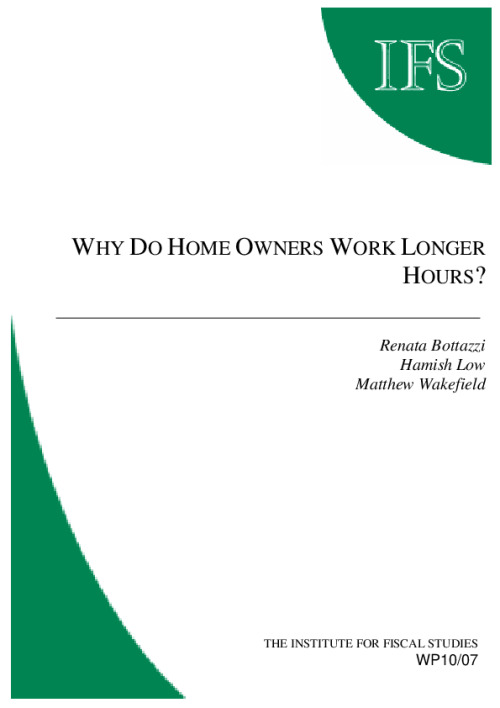Downloads

wp0710.pdf
PDF | 403.93 KB
<p>This paper uses a structural model to address the question of why home-owners with large mortgage debt work longer hours than those without such debt. We consider whether this is due to lower net wealth or to capital market imperfections, including mortgage constraints that depend on current earnings and, therefore, labour supply choices. We show that the need to meet current mortgage commitments can generate the observed correlation, and this impact of current commitments arises from the institutional borrowing constraints. We also show that labour supply as a function of household debt is highly nonlinear: those with greater debt are more likely to face binding borrowing constraints and their labour supply is more variable.</p>
Authors

Research Associate University of Bologna
Matthew is Associate Professor at the University of Bologna focusing on consumption and savings choices and how policy affects them.
Research Associate University of Bologna
Renata is an Associate Professor at the University of Bologna and IFS Research Associate, working on household consumption, saving and labour supply.

Research Fellow University of Oxford
Hamish is the James Meade Professor of Economics at the University of Oxford, a Professorial Fellow of Nuffield College and a Research Fellow at IFS.
Working Paper details
- DOI
- 10.1920/wp.ifs.2007.0710
- Publisher
- IFS
Suggested citation
R, Bottazzi and H, Low and M, Wakefield. (2007). Why do home owners work longer hours?. London: IFS. Available at: https://ifs.org.uk/publications/why-do-home-owners-work-longer-hours (accessed: 30 June 2024).
More from IFS
Understand this issue

Election Special: Your questions answered
27 June 2024

What is the two-child limit in benefits?
27 June 2024

Election Special: The big issues politicians haven't spoken about
25 June 2024
Policy analysis

What are the parties’ plans for benefits and taxes?
24 June 2024

How do the last five years measure up on levelling up?
19 June 2024

How would the parties’ tax and spending plans affect Scotland and Wales?
28 June 2024
Academic research

Income inequality in Ireland, 1987–2019
28 June 2024

Components of the evolution of income inequality in Sweden, 1990–2021
28 June 2024

The impact of labour demand shocks when occupational labour supplies are heterogeneous
28 June 2024